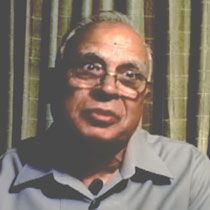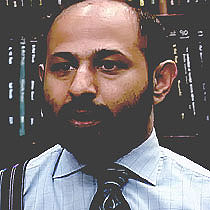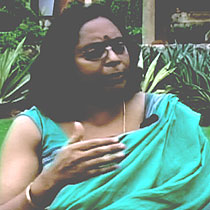2007年VOA标准英语-60th Anniversary of India-Pakistan Partition on
时间:2019-02-03 作者:英语课 分类:2007年VOA标准英语(八月)
By Steve Herman
New Delhi
09 August 2007
Sixty years ago this month, India and Pakistan became two separate independent nations, shedding British colonial rule. But independence brought violence and tragedy, because Pakistan was carved out of what had once been a single country, to create a Muslim homeland. Ten million people in the subcontinent were uprooted 1 from their homes and hundreds of thousands died in the upheaval 2. VOA's Steve Herman in New Delhi takes a look at the lingering problems resulting from Partition.
In a museum in New Delhi, an image of independent India's initial hopes springs to life. A robotic Jawaharlal Nehru accompanies a recording 3 of India's first prime minister speaking minutes before independence, at midnight August 15th, 1947.
"It means the ending of poverty and ignorance and disease and inequality of opportunity,” he said in his speech. “That may be beyond us but as long as there are tears and suffering, so long our work will not be over."
Sixty years on that work is not over. Hundreds of millions in India, Pakistan and Bangladesh are impoverished 4. And the memories of the violence that accompanied independence remain painful.

Pritam Singh Mahna
"I still remember. Whenever we face 15th August, I start weeping," says Pritam Singh Mahna, who in 1947 was a nine-year-old in what is now Punjabi Pakistan. Like nearly all Sikhs and Hindus in the predominately Muslim areas that became Pakistan, Mahna's family was forced to flee. "Yes, we would have been murdered by the Mohammedans."
Many leaders hoped that all could live peacefully together in the new nations -- one predominately Hindu and the other largely Muslim.
The father of Pakistan, Muhammed Ali Jinnah, believed there was no choice but to partition the subcontinent, otherwise, the Muslim minority would have been marginalized. "We must remember that we have to take momentous 5 decisions and handle grave issues facing us in the solution of the complex political problems of this great subcontinent inhabited by 400 million people."
Partition led to Hindus and Sikhs streaming out of West and East Pakistan while millions of Muslims sought haven 6 in Pakistan.
In sectarian fighting, hundreds of thousands of people died.

Farooqn Ahmad Dar
In Islamabad, Professor Farooq Ahmad Dar at Quaid-iAzam University recalls how his mother's family masqueraded as Hindus to escape to Pakistan. "That family was the only family which could manage to reach Pakistan alive. And that was because of the trick they used. They were protected by the Hindus and the Sikhs who killed all others."
That bloody 7 history has haunted relations. India and Pakistan have fought three times and the territory that prompted two wars, Kashmir, remains 8 disputed. The third war, in 1971, saw East Pakistan become independent Bangladesh. The two nuclear powers came close to war again in 2002.
Professor Dar says that many Pakistanis feel India wants to be the dominant 9 South Asian voice. "India needs to shed its superiority complex and this is exactly what Jinnah said in 1947. Their basic problem is they want to deal with Pakistan as a senior partner and that is not acceptable to anybody here in Pakistan."
There have been signs of reconciliation 10. In the past three years, the two governments have taken steps to improve relations.
Delhi University historian Visalakshi Menon says shared roots and continuing conflict shape the visions India, Pakistan and Bangladesh have of themselves and their neighborhood.

Visalakshi Menon
"There are really these conflicting emotions, that on the one hand there is hostility 11 and on the other hand there's a realization 12 that we have so much in common. After all, generations of a common heritage cannot be wished away," says the professor.
While many historians think partition was inevitable 13, they acknowledge it did not become the envisioned path to peace and prosperity.
Both India and Pakistan still suffer from domestic sectarian conflict, and they have struggled to end poverty. But both countries have seen strong economic gains in the past several years and they have taken larger roles in world affairs.
Citizens of the two countries still hope that means their governments will continue to move closer to the ideals of those who led the drive toward independence.
- Many people were uprooted from their homes by the flood. 水灾令许多人背井离乡。 来自《简明英汉词典》
- The hurricane blew with such force that trees were uprooted. 飓风强烈地刮着,树都被连根拔起了。 来自《简明英汉词典》
- It was faced with the greatest social upheaval since World War Ⅱ.它面临第二次世界大战以来最大的社会动乱。
- The country has been thrown into an upheaval.这个国家已经陷入动乱之中。
- How long will the recording of the song take?录下这首歌得花多少时间?
- I want to play you a recording of the rehearsal.我想给你放一下彩排的录像。
- the impoverished areas of the city 这个城市的贫民区
- They were impoverished by a prolonged spell of unemployment. 他们因长期失业而一贫如洗。 来自《简明英汉词典》
- I am deeply honoured to be invited to this momentous occasion.能应邀出席如此重要的场合,我深感荣幸。
- The momentous news was that war had begun.重大的新闻是战争已经开始。
- It's a real haven at the end of a busy working day.忙碌了一整天后,这真是一个安乐窝。
- The school library is a little haven of peace and quiet.学校的图书馆是一个和平且安静的小避风港。
- He got a bloody nose in the fight.他在打斗中被打得鼻子流血。
- He is a bloody fool.他是一个十足的笨蛋。
- He ate the remains of food hungrily.他狼吞虎咽地吃剩余的食物。
- The remains of the meal were fed to the dog.残羹剩饭喂狗了。
- The British were formerly dominant in India.英国人从前统治印度。
- She was a dominant figure in the French film industry.她在法国电影界是个举足轻重的人物。
- He was taken up with the reconciliation of husband and wife.他忙于做夫妻间的调解工作。
- Their handshake appeared to be a gesture of reconciliation.他们的握手似乎是和解的表示。
- There is open hostility between the two leaders.两位领导人表现出公开的敌意。
- His hostility to your plan is well known.他对你的计划所持的敌意是众所周知的。
- We shall gladly lend every effort in our power toward its realization.我们将乐意为它的实现而竭尽全力。
- He came to the realization that he would never make a good teacher.他逐渐认识到自己永远不会成为好老师。
- Mary was wearing her inevitable large hat.玛丽戴着她总是戴的那顶大帽子。
- The defeat had inevitable consequences for British policy.战败对英国政策不可避免地产生了影响。